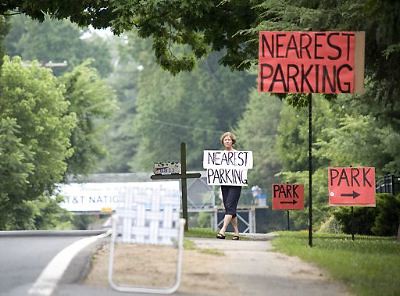Upping our "short game" on transportation demand management planning for sporting events
DC messed up with regard to the Nationals baseball team. Not only did we give them a $600+ million stadium, displacing a lot of things in the bargain, including the Washington Sculpture Center, and we can't even tax the players on their income unless they live in the city (even cities like New York get to tax home and visiting players on their income for days they play baseball in Yankee Stadium and Citi Field)... but we didn't put into the contract a requirement for the team to pay towards WMATA service when late games go past the time that the subway system normally operates. See the WAMU Radio story, "D.C., Nationals Still Wrangling Over Late-Night Metro" (print and audio stories). From the article:
Without a deal in place, it's possible some fans could need some help getting home if a game runs late. Thousands of fans take Metro to the games, given the limited parking near the stadium.
During past seasons, the city covered the costs of bringing in extra trains if there was a long rain delay or epic 18-inning contest that caused a game to end past Metro's normal operating hours.
But that agreement is unique. All of the other sports teams and concert venues in our area pay Metro for any late-night service.
Council Member Tommy Wells says he would to see the Nationals pick up the tab, which Metro says costs $90,000 per hour.
During a hearing before the council's public works and transportation committee, Wells questioned Metro's general manager Richard Sarles about what happens if the Nationals and D.C. don't reach a deal.
"In the event you don't get confirmation and there is a rain delay, can you run the extra hour or do you not?" Wells asked.
"The funds have to come from somewhere to pay for it and that's what we would like to get resolved," said Sarles.
Recommendation: DC should institute requirements for transportation demand management on the operators of event venues such as RFK Stadium, the DC Armory, Nationals Stadium, and the Verizon Center.
2. Greater Greater Washington reports, in "US Open pushes driving over Metro," that the US Open at the Congressional Golf Course in Montgomery County is going to bus people for free from "satellite" parking lots at the County Fairgrounds in Gaithersburg--a 15 mile haul each way--but that if people choose to take a shuttle to the course from the Grosvenor Metro Station, they'll have to pay $8.

Photo from the 2009 Gazette story, "Tournament parking moves to fairgrounds: Other satellite lots will be in Bethesda, Potomac." Caption: In the past, residents along Bradley Boulevard in Bethesda have opened their lawns and backyards for visitors in search of parking for the AT&T National golf tournament at the Congressional Country Club. Residents are required to get a permit to sell parking on their property. County traffic engineer Mike Kinney said he did not expect this situation to cause problems this year.*
Granted most people going to the match are likely to not take Metro, but balanced transportation demand management planning requirements should be in place regardless, and transit users should not be penalized while drivers not only get free parking and a free trip on the shuttle.
Recommendation: Other communities should impose transportation demand management requirements on venues such as concert halls (think how grotesque it is to get to what used to be called the Nissan Pavilion way out yonder in Virginia--I went there once and said never again), arenas, stadiums, and other venues such as golf courses, when they hold tournaments and events which generate a great deal of traffic.
---
* Note that residents parking cars on their lawns is a tried and true practice in college towns on football Saturdays. I lived in a house a couple blocks from Michigan Stadium. The landlord kept the right to park cars on the lawn. At another house, we did something similar for the Art Fair in July. And I helped someone park cars on her lawn one year, and we split the profits.
Labels: car culture and automobility, parking and curbside management, sports and economic development, transit, transportation demand management, transportation planning



0 Comments:
Post a Comment
<< Home